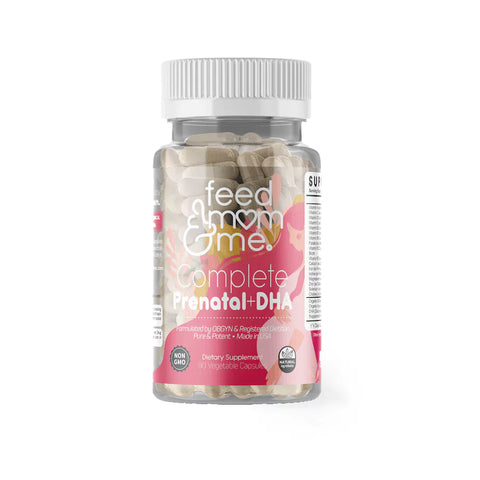Benefits of Magnesium During Pregnancy
Published:Updated:
 Written by: Jacquelyn Leone; LIU Post Dietetic Intern
Written by: Jacquelyn Leone; LIU Post Dietetic Intern
In This Article:
★ WHAT IS MAGNESIUM?
★ WHAT ARE THE BENEFITS OF MAGNESIUM?
★ IS IT SAFE TO TAKE MAGNESIUM WHILE PREGNANT?
★ HOW MUCH MAGNESIUM PER DAY FOR A PREGNANT WOMAN?
★ HOW MUCH MAGNESIUM IS TOO MUCH DURING PREGNANCY?
★ CAUSES OF MAGNESIUM DEFICIENCY AND SYMPTOMS DURING PREGNANCY
★ FOODS HIGH IN MAGNESIUM
★ BEST MAGNESIUM SUPPLEMENTS FOR PREGNANCY
If you’re reading this, you may be asking yourself, “What is magnesium good for?”, “What are the benefits of taking magnesium?” and “Where can I find magnesium?”. You may most importantly be asking yourself, “Is magnesium safe during pregnancy?”.
The human body needs many vital nutrients to maintain overall health and wellness. Magnesium is one of the essential vitamins necessary for maintaining health and is responsible for multiple aspects of our health. When pregnant, it is crucial to include the many essential nutrients into your daily diet, and magnesium is one of those.
Read on to learn more about magnesium benefits during pregnancy, the risk factors, and how to get magnesium from foods.
★ WHAT IS MAGNESIUM?
Magnesium is the fourth most abundant mineral in the entire body and is a compound in more than 300 enzyme systems. Magnesium plays an important role in many things, such as brain function, heart health, and even exercise performance. [1] It is also a component of bones, as a matter of fact 60% of magnesium is stored in your bones. [2]
When pregnant, the body's general needs increase. Along with many other essential nutrients, the body's need for magnesium also increases. It’s commonly recommended that pregnant women get about 350-450 mg of magnesium per day.
★ WHAT ARE THE BENEFITS OF MAGNESIUM?
Magnesium aids in relaxing muscles, regulates body temperature, maintains healthy blood sugar levels, and helps build strong teeth and bones. It also regulates cholesterol and heartbeat. [1] Additionally, it can provide a more restful sleep and aid in mood stabilization. [3]
Particularly pertaining to pregnancy, having cramps, constipation, and other minor health conditions can occur along the way. However, these are not long-term issues.
Magnesium has been shown to reduce pain, muscle and leg cramps. Constipation and digestive issues can occur due to intestinal crowding from growing a baby inside the body. Magnesium can treat occasional constipation, providing easier and more frequent bowel movements. [4]
Lastly, in terms of pregnancy complication prevention, limited and early research has shown magnesium to positively affect pregnancy outcomes. Some outcomes include a decrease in the probability of hypertension, heart disease, preeclampsia, placental dysfunction, preterm labor, and low birth weight associated with childbirth. [1]
★ IS IT SAFE TO TAKE MAGNESIUM WHILE PREGNANT?
Yes! Magnesium is safe to take during pregnancy. This mineral is not only important for many processes in your body, it is also important for your baby’s developing body.
According to a randomized control trial study that examined three groups of 60 women, found there are several ways magnesium can potentially improve you and your baby’s health. [5]
The daily recommended dosage of magnesium varies depending on your age. Before supplementation, always consult your doctor and/or healthcare professional first.
★ HOW MUCH MAGNESIUM PER DAY FOR A PREGNANT WOMAN?
There are various recommendations for magnesium. Here are the recommended daily intakes for magnesium during and after pregnancy in milligrams per day:[1]
- Pregnant women 18 and under: 400 mg per day
- Pregnant women ages 19 to 30: 350 mg per day
- Pregnant women ages 31 to 50: 360 mg per day
- Breastfeeding women 18 and under: 360 mg per day
- Breastfeeding women ages 19 to 30: 310 mg per day
- Breastfeeding women ages 31 to 50: 320 mg per day
★ HOW MUCH MAGNESIUM IS TOO MUCH DURING PREGNANCY?
High doses of magnesium from food are safe because the kidneys eliminate excess amounts through urination. The same can’t be said for oral magnesium supplements. [2] The FDA suggests dietary supplement intake should not exceed any more than 350mg. [1]
Excessive amounts of magnesium from dietary supplements can lead to toxicity in the blood. Common side effects of too much magnesium include nausea, vomiting, diarrhea, cramping, and an upset stomach. [1]
In general, always make sure to get frequent blood tests and review with a doctor and/or healthcare professional. Call your doctor and/or pharmacist for medical advice and seek medical attention about any negative side effects experienced.
★ CAUSES OF MAGNESIUM DEFICIENCY AND SYMPTOMS DURING PREGNANCY
Magnesium deficiency can be found in women of childbearing age. Along with this, the need for magnesium increases during pregnancy. Deficiency during pregnancy may pose a health risk for both the mother and baby. Common causes of deficiency include[5]:
- Inadequate dietary intake
- Poor gastrointestinal absorption
- Increased losses through the gastrointestinal and/or renal systems
- Increased need (pregnancy, high blood pressure)
How to know if you are deficient in magnesium? While deficiency is rare, common signs and symptoms of deficiency include[6]:
- Nausea
- Vomiting
- Poor memory
- Decreased appetite
- Insomnia
★ FOODS HIGH IN MAGNESIUM
Before supplementing, it is recommended to obtain vitamins and minerals through diet first. It is essential to include magnesium-rich foods in your daily diet to enhance and ensure adequate magnesium consumption.
In general, magnesium can be found in food sources such as greens, nuts, seeds, beans, and whole grains. But how much magnesium is in different foods? Here is a list of foods high in magnesium[1]:
- Pumpkin seeds: 168 mg in 1 oz
- Almonds: 80 mg in 1 oz
- Spinach: 78 mg in ½ cup cooked
- Black beans: 60 mg in ½ cup cooked
- Dark chocolate: 50 mg in 1 oz
- Peanut butter: 49 mg in 2 tablespoons
- Brown Rice: 42 mg in ½ cup cooked
- Low Fat Yogurt: 42 mg in 8 oz
- Oatmeal, instant: Serving Size 1 packet, 36 mg
- Banana: 32 mg in 1 medium banana
- Milk: 24–27 mg in 1 cup

★ BEST MAGNESIUM SUPPLEMENTS FOR PREGNANCY
The Feed Mom and Me Prenatal Vitamin is one of the best over-the-counter prenatal Vitamins. It contains 50 milligrams of Magnesium(Oxide) to be sure that both mother and baby are receiving adequate supplementation while your baby is developing!
This prenatal is formulated by an OBGYN & Registered Dietitian, containing all the nutrients needed during and after pregnancy. Each small and easy-to-swallow pill is packed with 22 key natural nutrients to provide nutritional support for you and your breastfeeding newborn. It contains calcium, iron, folate, vitamins A, E, C, D, and B complex, iron, choline, DHA, magnesium, iodine, selenium, and zinc.
The vegetarian formula is free of artificial colors and flavors, chemicals, preservatives, non-GMO, non-dairy, soy-free, and is gluten-free. Each of their capsules contains B6, Organic Ginger, and Peppermint Powder, which can help alleviate morning sickness and nausea.
Adding to that, it is a women-owned company. Who better than a female would understand pregnancy!
- https://ods.od.nih.gov/factsheets/Magnesium-HealthProfessional/
- https://www.hsph.harvard.edu/nutritionsource/magnesium/
- https://pubmed.ncbi.nlm.nih.gov/23950577/
- https://www.wildish.co/blog/2019/9/25/the-importance-of-magnesium
- https://www.ncbi.nlm.nih.gov/pmc/articles/PMC5590399/
- https://www.healthdirect.gov.au/magnesium-deficiency
- https://academic.oup.com/nutritionreviews/article/74/9/549/1752003
